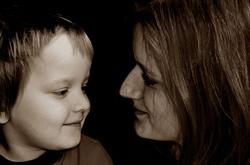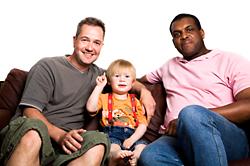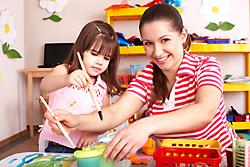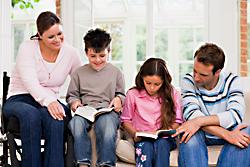Despite our tireless work to spread the message about fostering, unhelpful myths still abound about fostering and who can foster children.
So we thought it might be time for a little bit of myth busting. Here's Family Fostercare's answer to the Top 10 Fostering Myths!

FOSTERING MYTH #1
I'd love to foster but I can't afford to
You do not have to be well off to foster children. Fostering is an amazing thing to do for young people, but it is not charity. As an approved foster carer you would be paid a fostering allowance, which covers the extra household and general costs of having a young person living with you, any special expenses involved in their care and rewards your work as a professional foster carer. Foster carers get tax relief on the money they make from fostering, and their benefits will usually not be affected. The government has also pledged a fund to each local authority to protect groups like foster carers from the ‘Bedroom Tax’.
Request Info Pack

FOSTERING MYTH #2
I'd love to foster but I'm too old (or too young!)
If you’ve got enough energy to foster lively children, then you are not too old to foster! Legally there are no upper age limits on fostering, and many people come to fostering a littler later in life, after their children have left home for example. Older foster carers can bring considerable expertise and life experience to fostering, and young people can benefit greatly from the calming, steadying influence of an older foster carer. On the other hand, if you’re under 30 but can demonstrate you have the experience, commitment and dedication to foster young people then you’re not too young to foster! People in the 25 – 35 age bracket can bring a great deal of empathy and understanding to the role, which can help greatly with the communication and trust relationship between fostered child and foster carer.
Request Info Pack

FOSTERING MYTH #3
I’d love to foster but I don’t own my own home
Foster carers do not need to own their own home. Whether you have a mortgage, or are a private or council tenant makes no difference to your ability to give a young person a safe, secure and loving place to call home. As long as you have enough room in your home to be able to give each young person their own bedroom, and as long as you can offer a safe and secure home environment for young people then you can foster.
Request Info Pack

FOSTERING MYTH #4
I’d love to foster but I'm a man
Men can be foster carers too! Many men foster, and in fact the unique value of male carers is only now becoming more widely recognised. When a man fosters, he is able to present positive male role models for both male and female foster children. This can have a restorative and therapeutic effect on many fostered children whose fathers may have been absent or abusive.
Request Info Pack

FOSTERING MYTH #5
I’d love to foster but I'm single
You don’t have to be married to foster. You don’t even have to be part of a couple! Single people can and do make great foster carers. Of all fostering agencies, Family Fostercare especially understands and respects that families come in all shapes and sizes. To us it’s not your marital status that is important but your ability to meet a young person’s needs.
Request Info Pack

FOSTERING MYTH #6
I’d love to foster but I'm not a parent
You don’t need to have had your own children to foster. Before embarking on the journey of becoming a foster carer, we – your fostering agency – need to be comfortable that you have enough experience of being around young people to know, broadly speaking, what is involved with caring for a child. It doesn’t matter whether you have gained this experience through caring for your own children, through caring for young people in your extended family or friends network, or through working with young people as part of your job. The skills to foster training that you will undertake as part of your application to foster will give you the actual practical and specialist skills involved in looking after fostered children.
Request Info Pack

FOSTERING MYTH #7
I’d love to foster but I'm gay
You don’t need to have had your own children to foster. You do not have to be heterosexual to foster. Much like your marital status, your sexual orientation is not important to us when we are determining your ability to provide a safe home and sensitive care to a fostered young person. Every young person in need of foster care is different, with their own story and challenges, so there needs to be diversity among the foster carer community too. Whether you are lesbian, gay, bisexual, heterosexual or asexual doesn’t matter, it’s the life experiences you can bring to the role of foster carer that can help you to help the young people who live with you – that’s what counts.
Request Info Pack

FOSTERING MYTH #8
I’d love to foster but I don't want to give up work
Depending on your circumstances you can sometimes foster and continue to work. It might just make a difference to the type of fostering that you can do. Obviously very young children, or young people needing special care, will need someone to be there with them all day. If you are part of a couple of course only one of the carers need be at home, so the other can work. Or you could look to foster older, school-age children and combine your work outside of the home with their care. Many people manage to successfully combine a job with their responsibilities as a foster carer, and if this is what you want to do you should not let it prevent you from applying to foster.
Request Info Pack

FOSTERING MYTH #9
I’d love to foster but my children still live at home
Great, then you’ve got valuable parenting experience! Many people look after their own children and foster at the same time, and in fact research has shown there can be enormous benefits for both the fostered children and the birth children if you do. When people with their own children decide to foster, the whole family become part of the fostering process, and your children will be invited to share their thoughts and give their input, in age-appropriate ways of course. We will take extra care at the matching stage to ensure that the young people that come to live with are a good fit for all your family. As long as you have room in your home and in your life for another child, of course you can still foster even if your own children are still at home (in fact over 50% of foster carers do!).
Request Info Pack

FOSTERING MYTH #10
I’d love to foster but I have a disability
Family Fostercare welcomes applicants living with a disability. Every prospective foster carer goes through the same assessment process, which includes a medical check to check for any health or disability issues that would prevent them from being able to provide the best standard of care to a young person. As long as you can give a fostered young person a safe, secure and happy home then your disability should not stand in your way of doing so. It may even mean you can bring a unique set of life experiences to the role of foster carer, which may give a different perspective, hope and inspiration to the young people whose lives you touch through fostering.
Request Info Pack
If you’re reading this article then it may be because you are considering fostering, or have considered it in the past, but are worried that you may not be suitable. Family Fostercare is here to give you all the advice you need on how to become a foster carer. But if you asked us what our Number 1 piece of advice for prospective foster carers is, do you know what it would be?
Stop reading, assume nothing, talk to us now!
One friendly free call to Family Fostercare on 0800 321 3230 (or enquire online if you prefer) could put your mind at ease and get you on the path to a truly rewarding career as a foster carer.
